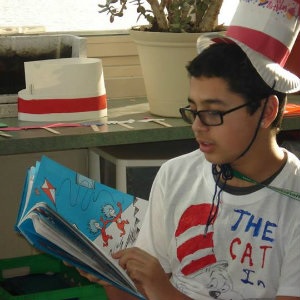 Children often look forward to summer vacation — and for good reason. They can spend more time participating in enjoyable activities, from playing with friends and siblings to attending summer camp and more.
Children often look forward to summer vacation — and for good reason. They can spend more time participating in enjoyable activities, from playing with friends and siblings to attending summer camp and more.
Parents, meanwhile, may worry about their children slipping in their reading abilities during this three-month break from school, but there’s actually quite a bit that you can do to:
- reinforce those skills
- minimize reading loss
- prepare your children for reading during the next grade in the fall
Take a look at these six activities and select the ones that coincide with your child’s skill level or make age-appropriate adjustments.
#1 Read Out Loud
Scholastic.com notes that, when children read out loud, they’ll likely read more slowly, giving them time to process the story and improve their comprehension of what’s going on. Plus, when books are read aloud by your child, they can see AND hear the words. People in your family can take turns reading out loud, giving everyone time to practice — and everyone time to simply listen and enjoy.
#2 Participate in Library Story Hours
Sign your child up for story hour at your local library. If you’re not sure what’s available, just type “library storytime near me” into Google and you’ll probably get all kinds of great results. Go early (or stay afterward) to pick out books to read at home. If your child is old enough, allow them to get their own library cards and make a family trip to the library every week.
If you want your child to use these books to practice their reading skills (rather than having you read the books to them), Scholastic suggests that you choose ones where your child can recognize at least 90% of the words without help. If they need to stop more than that, they may struggle to focus on the story’s overall meaning.
#3 Read to Your Children
This can be a bedtime story where you read to your children, and they can relax and enjoy the story. When they just listen to a book, they can be introduced to and process new words in a low-stress way.
This allows them to expand their vocabularies, and when they see these words in a book that they’re reading themselves, they’ll already have some familiarity with them.
#4 Let Yourself Get “Caught”
Let your children “catch” you reading books, magazines, newspapers and online articles. Children are wonderful mimics and love to follow their parents’ leads so, become a reading role model. Tell your children about the books you’re currently reading, share with them what you love about reading, and let them know which books are your all-time favorites. This can open up conversations about what they enjoy reading.
#5 Incorporate Reading into Everyday Life
Ways you can do this include (but definitely aren’t limited to) the following:
- Play the alphabet game while driving, looking for signs that start with each letter of the alphabet in turn.
- Ask your child to read food and product labels when you’re shopping.
- When your child has questions, search for answers online and read the results together.
#6 Create a Reading Area
Have an area in your home where your child can comfortably read and keep books organized and readily available. This can help to build an overall appreciation for reading.
Horizon Education Centers
Building and reinforcing reading skills — and encouraging the appreciation and enjoyment of this activity — is at the heart of what we do in our child care programs.






